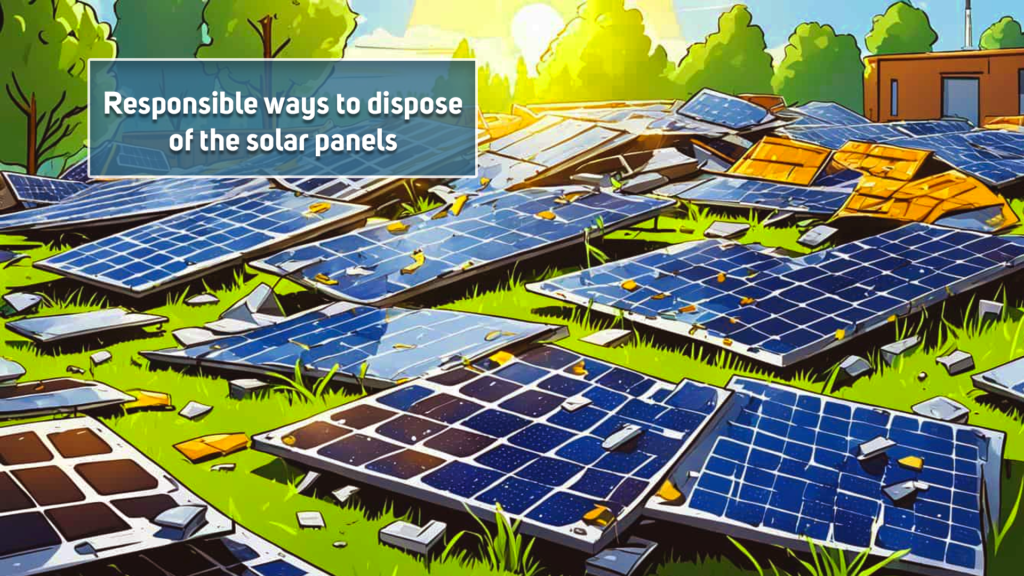With the increasing adoption of solar energy, it’s essential to understand the responsible ways to dispose of the solar panels. As solar panels reach the end of their lifespan, which is typically around 25-30 years, proper disposal becomes a critical issue. In this blog, we will explore various responsible methods to handle solar panel disposal, ensuring minimal environmental impact and promoting sustainability.
Why is there a need to dispose of solar panels?
Solar panels need to be disposed of primarily due to their finite lifespan, which typically ranges from 25 to 30 years. Over time, the efficiency of solar panels decreases, reducing their ability to generate electricity effectively. Additionally, technological advancements continually improve solar panel efficiency, making older models obsolete and less desirable. Environmental and safety concerns also necessitate proper disposal, as solar panels contain materials like cadmium, lead, and other heavy metals that can be harmful if not handled correctly. Proper disposal and recycling of solar panels help recover valuable materials and minimize the environmental impact, promoting sustainability in the solar industry.
What Are the Effective Ways for Responsible Disposal or Recycle of Solar Panels?
As solar energy becomes increasingly popular, the need for liable disposal or recycling of solar panels is growing. Solar panels, although durable and long-lasting, eventually reach the end of their life cycle. Proper disposal or recycling is essential to minimize environmental impact and recover valuable materials. Here are some effective ways to ensure responsible disposal or recycling of solar panels:
- Recycling Solar Panels
Recycling is one of the most effective responsible ways to dispose of solar panels. Solar panels are made up of materials like glass, aluminum, and semiconductor materials, which can be recovered and reused. Specialized recycling facilities can extract these components, reducing the need for raw materials and minimizing waste.
- Reusing Functional Components
Another responsible method is reusing functional components. Many parts of a solar panel, such as the frame and wiring, may still be in good condition even if the panel itself is no longer efficient. These components can be repurposed for other applications, extending their lifecycle and reducing waste.
- Manufacturer Take-Back Programs
Many solar panel manufacturers offer take-back programs as part of their commitment to sustainability. These programs ensure that used panels are returned to the manufacturer for proper recycling or disposal. Participating in these programs is a straightforward and responsible way to dispose of solar panels.
- Donating to Educational Institutions
Donating used but still functional solar panels to educational institutions is another excellent disposal method. Schools and universities can use these panels for educational purposes, providing hands-on learning experiences for students in renewable energy courses. This not only disposes of the panels responsibly but also promotes education.
- Utilizing Certified E-Waste Recyclers
Certified e-waste recyclers specialize in the responsible disposal of electronic waste, including solar panels. These recyclers follow strict guidelines to ensure that hazardous materials are handled safely and valuable materials are recovered. Utilizing certified e-waste recyclers is a reliable way to dispose of solar panels responsibly.
- Legislation and Compliance
Adhering to local, national, and international legislation regarding solar panel disposal is crucial. Regulations often dictate specific disposal methods to minimize environmental impact. Compliance with these laws ensures that disposal practices are responsible and environmentally sound.
The Role of Innovation in Disposal
Innovation plays a significant role in developing new responsible ways to dispose of solar panels. Research and development in recycling technologies and alternative disposal methods continue to evolve, offering more efficient and sustainable solutions. Staying informed about these advancements is essential for responsible disposal.
Some of the Environmental and Economic Benefits of disposal:
Responsible disposal of solar panels offers both environmental and economic benefits. Environmentally, it reduces pollution and conserves resources. Economically, recycling and reusing materials can lower production costs for new panels. These benefits highlight the importance of adopting responsible disposal practices.
- Public Awareness and Education
Raising public awareness and education about the responsible ways to dispose of the solar panels is vital. Informing consumers about disposal options and encouraging participation in recycling programs can significantly impact overall disposal practices. Public education campaigns can drive positive change.
- Industry Collaboration
Collaboration within the solar industry is essential for developing and implementing responsible disposal practices. Manufacturers, recyclers, policymakers, and consumers must work together to create a sustainable disposal ecosystem. Industry collaboration ensures that all stakeholders are aligned in their efforts.
What Challenges do you face in Solar Panel Disposal?
Despite the best efforts, there are challenges in the responsible disposal of solar panels. These include the varying composition of panels, the logistics of collection and transportation, and the cost of recycling processes. Ongoing research and funding are necessary to tackle these difficulties.
The Future of Solar Panel Disposal
The future of solar panel disposal lies in continued innovation and collaboration. As technology advances, more efficient and cost-effective methods of recycling and disposal will emerge. The solar industry must remain committed to sustainability, ensuring that disposal practices keep pace with the growth of solar energy.
Conclusion
In conclusion, understanding and implementing the responsible ways to dispose of solar panels is crucial for the environment and the sustainability of the solar industry. Recycling, reusing components, participating in take-back programs, donating to educational institutions, and utilizing certified e-waste recyclers are all effective methods. Adhering to legislation, promoting innovation, and fostering industry collaboration are also essential. By raising public awareness and addressing disposal challenges, we can ensure a sustainable future for solar energy. As the solar industry continues to grow, so must our commitment to responsible disposal practices.





